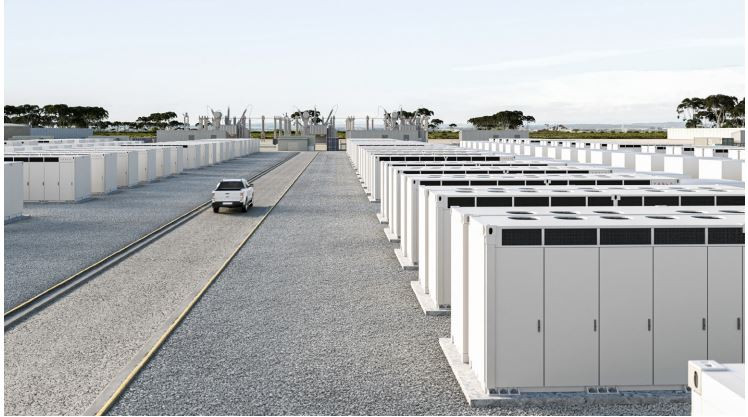Analysis Of Funding Strategies For A 270MWh BESS In Belgium's Merchant Market

Table of Contents
Understanding the Belgian Energy Market and BESS Opportunities
The Role of BESS in Stabilizing Belgium's Grid
Belgium's electricity grid faces increasing pressure from the integration of intermittent renewable energy sources. This intermittency causes fluctuations in supply, impacting grid stability. A 270MWh BESS can significantly mitigate these challenges:
- Peak Demand Management: BESS can discharge during peak demand periods, reducing reliance on expensive peaker plants and improving grid stability.
- Frequency Regulation: BESS can provide fast-responding frequency regulation services, ensuring grid stability and reliability.
- Renewable Energy Integration: By storing excess renewable energy during periods of high generation, BESS allows for smoother integration of solar and wind power, maximizing their utilization.
Belgium's regulatory framework is increasingly supportive of BESS deployment, offering incentives and potentially creating favorable conditions for investment. The evolving merchant market structure in Belgium, which allows for direct energy trading, presents attractive revenue streams for BESS operators through arbitrage and ancillary services.
Market Analysis: Demand and Profitability Projections for a 270MWh BESS
Projecting the precise ROI for a 270MWh BESS in Belgium's merchant market requires a detailed financial model considering various factors. However, key indicators point to a potentially high return:
- Projected Energy Prices: Analyzing historical and future energy price forecasts in Belgium will be crucial in determining the profitability of arbitrage strategies.
- Market Dynamics: Understanding the competition within the merchant market, including other BESS operators and traditional power plants, will help refine revenue projections.
- Revenue Streams: Beyond arbitrage, potential revenue streams include frequency regulation, capacity market participation, and potentially even ancillary services provided to the distribution network. A comprehensive revenue model is needed to quantify these diverse income sources.
Exploring Diverse Funding Avenues for the 270MWh BESS Project
Equity Financing: Private Investment and Venture Capital
Attracting private equity or venture capital can provide significant upfront capital. However, this often involves relinquishing a degree of ownership and control.
- Advantages: Large capital injection, access to expertise, potential for faster project deployment.
- Disadvantages: Dilution of ownership, potential loss of control, investor expectations regarding ROI.
Identifying investors with a strong track record in the renewable energy sector, particularly BESS projects, is crucial. Investment criteria will often include a robust business plan, detailed financial projections, and a clear understanding of market risks.
Debt Financing: Bank Loans and Green Bonds
Securing bank loans or issuing green bonds offers a less dilutive approach, but requires demonstrating strong creditworthiness and providing sufficient collateral.
- Advantages: Retains ownership, predictable repayment schedule.
- Disadvantages: Higher interest rates, strict lending criteria, potential for increased financial risk.
Government-backed loan guarantees can significantly enhance the feasibility of securing debt financing, reducing the perceived risk for lenders. The attractiveness of green bonds to environmentally conscious investors also presents a considerable opportunity.
Public Funding and Subsidies: Government Grants and Incentives
Belgium offers various government programs designed to incentivize renewable energy projects, potentially including grants, subsidies, and tax incentives specifically for BESS deployment.
- Advantages: Reduced upfront capital requirements, potentially lower overall project cost.
- Disadvantages: Competitive application process, strict eligibility criteria, bureaucratic hurdles.
Thorough research into available programs and careful adherence to application requirements are essential to maximize chances of securing public funding.
Hybrid Funding Models: Combining Equity and Debt
A hybrid approach, blending equity and debt financing, often presents the most balanced solution.
- Advantages: Reduced reliance on a single funding source, diversification of risk, potentially better terms from both equity and debt providers.
- Disadvantages: Increased complexity in structuring the financing, negotiation challenges with multiple stakeholders.
Successful hybrid models often leverage the strengths of each funding source, combining the upfront capital of equity with the stability of debt financing.
Risk Assessment and Mitigation Strategies for BESS Investment
Technological Risks: Battery Degradation and Performance
Battery degradation is a significant concern for BESS projects.
- Mitigation Strategies: Securing long-term warranties from reputable battery manufacturers, incorporating robust battery management systems, and meticulous lifecycle management are key mitigation strategies. Performance guarantees are also crucial for assuring expected operational lifespan.
Market Risks: Price Volatility and Regulatory Changes
Energy price volatility and changes in regulatory frameworks can significantly impact project profitability.
- Mitigation Strategies: Employing sophisticated financial modeling to incorporate price uncertainty, securing long-term power purchase agreements (PPAs), and actively monitoring regulatory developments are essential for mitigating these risks. Hedging strategies in energy markets can also play a vital role.
Financial Risks: Interest Rate Fluctuations and Default
Fluctuations in interest rates and the potential for project default pose significant financial risks.
- Mitigation Strategies: Detailed financial modeling incorporating various interest rate scenarios, securing appropriate insurance coverage, and maintaining a strong cash flow position are critical for mitigating financial risk.
Comparative Analysis of Funding Options and Recommendation
Based on the analysis, a hybrid funding approach—combining equity financing to secure initial capital and debt financing (potentially including green bonds) to cover a portion of the project cost—appears optimal for a 270MWh BESS in Belgium's merchant market. This strategy mitigates the risks associated with relying on a single funding source and leverages the strengths of both equity and debt to ensure project viability. Successful negotiation of favorable terms with lenders, combined with securing available government incentives, will be crucial for achieving a sustainable and profitable investment.
Conclusion: Key Takeaways and Call to Action
The optimal funding strategy for a 270MWh BESS project in Belgium's merchant market likely involves a balanced approach, combining equity and debt financing and leveraging available government incentives. Careful consideration of technological, market, and financial risks is paramount. This analysis highlights the complexities involved and underscores the necessity for a thorough due diligence process. Conduct your own thorough analysis of funding strategies for your BESS project, considering the specific circumstances and risk tolerance. Learn more about optimizing funding strategies for similar BESS deployments in the Belgian merchant market to ensure the successful integration of this crucial technology within Belgium's energy transition.

Featured Posts
-
 Are Kanye West And Bianca Censori Back Together
May 04, 2025
Are Kanye West And Bianca Censori Back Together
May 04, 2025 -
 Scotlands Coastal Restoration A Focus On Seagrass Planting Bids
May 04, 2025
Scotlands Coastal Restoration A Focus On Seagrass Planting Bids
May 04, 2025 -
 Britains Got Talent Young Contestant Withdraws Onstage
May 04, 2025
Britains Got Talent Young Contestant Withdraws Onstage
May 04, 2025 -
 Review The Count Of Monte Cristo A Masterpiece Of Revenge
May 04, 2025
Review The Count Of Monte Cristo A Masterpiece Of Revenge
May 04, 2025 -
 Ibf Heavyweight Eliminator Hrgovic Vs Sanchez Officially Ordered
May 04, 2025
Ibf Heavyweight Eliminator Hrgovic Vs Sanchez Officially Ordered
May 04, 2025
